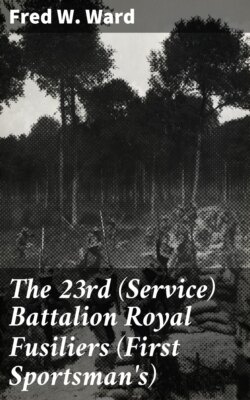Читать книгу The 23rd (Service) Battalion Royal Fusiliers (First Sportsman's) - Fred W. Ward - Страница 5
На сайте Литреса книга снята с продажи.
FROM MAJOR-GENERAL SIR C.E. PEREIRA, K.C.B., C.M.G.ToC
ОглавлениеTable of Contents
The history of any New Army battalion is a valuable contribution to the history of the war. This applies particularly to a battalion like the 23rd Royal Fusiliers, which achieved a high morale and maintained excellent discipline throughout the war.
At the Front our only knowledge of the New Army before they came overseas was gained from the Brigade Staffs and Commanding Officers of the new Formations, who were sent over for short attachment to troops in the line.
We learnt from them the great difficulties that had to be overcome in raising new units, with very few officers, warrant officers, and N.C.O.'s to lead the new force and instruct them in military routine. Without exception they were filled with admiration of the physique, intelligence, and spirit of the men who had rushed to arms in those dark early days of the war.
It was evidently the flower of the nation that came forward, and probably in the history of all wars such magnificent material has never been equalled.
My acquaintance with the 23rd Battalion Royal Fusiliers extended from the end of 1916 to March, 1919, when the Battalion left the 2nd Division, and it is interesting to look back at my first impression of the Battalion, as I had not previously had any New Army battalions under my command. Regular battalions have the pride of history to sustain them, and traditions to live up to, but here I found a battalion not two years old, with its history in the making, but with the same spirit and self-consciousness that one finds in the old formations.
Those who have not had considerable experience of troops in peace and war may imagine that regiments are, at all times, sustained by a great pride in their past, and a determination to live up to it. Alas! in some cases this spirit dies away in adversity. I have seen the 23rd Royal Fusiliers in good times and in bad, and I have never found them downhearted.
When out for a few weeks' rest and training, in pleasant surroundings, their work and play were carried out with much life and zest.
In the fighting in the Cambrai salient, in the Bourlon-Mœuvres Ridge, on November 30, 1917, when the 2nd Division defeated six successive attacks on their line, the 23rd Royal Fusiliers at the end of the day held their line intact. This action was followed two days later by a withdrawal which was necessary to get us out of a sharp salient. This entailed very hard work and constant trench fighting, extending over several days. The troops were very exhausted from the extremely heavy calls that had been made on them, but after a few days' rest it was almost incredible how rapidly they had thrown off their fatigue and how good their spirits were.
They knew they had killed large numbers of Germans, and had successfully defeated a German attack which, if successful, would have been a great disaster for the British.
A more trying time was the March retreat in 1918. Lieutenant-Colonel Winter had lost his voice from the effect of several days of very heavy gas shelling of the Highland Ridge just before the Germans launched their attack, and he was voiceless for the next ten days. A large proportion of his Battalion were similarly affected, but time after time during the retreat they turned and fought, and inflicted heavy losses on the enemy until they did their share in repelling a heavy attack at Beaumont Hamel, where the Germans were finally held.
It was the spirit of such battalions as the 23rd Royal Fusiliers that broke the German offensive, and the marvellous power of recuperation that they had, given a few days to rest and sleep.
In the offensive operations that lasted from August 21, 1918, to the Armistice, the Battalion delivered many successful attacks with undiminished dash and courage, and it was a proud day when I saw them march through the Square in Duren with fixed bayonets, headed by the few Regimental pipers that had been through the war with them since their formation.
Well had they earned their Victory March into Germany, and Lieutenant-Colonel Winter was justified in his great pride in their fine appearance and magnificent transport.
In conclusion I must pay a tribute to the private soldiers, the non-commissioned officers, and the young officers, who, year in and year out, faced death and the greatest of hardships with that dogged courage that has always broken the hearts of our enemies. The saying that the British soldier never knows when he is beaten has never been truer than in this war.
My hope is that histories such as this may have a wide circulation, so that mothers, wives, and children may know what their men have done for their country, what dangers they have faced, and what vast sacrifices they cheerfully made.
